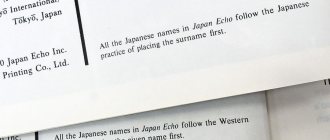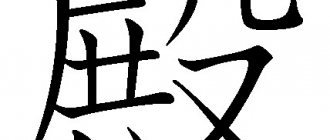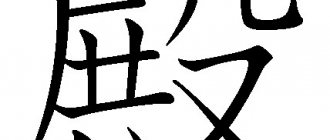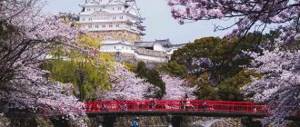The Japanese are one of the most courteous and polite nations. This has affected the language: there are several levels of addressing the interlocutor. One is applicable when interacting with a senior and superior in rank, the other - with a peer or friend, the third - with a junior or subordinate. When communicating with old acquaintances, the Japanese use simple figures of speech; when greeting strangers, they are polite and distant. To say “hello” in Japanese without offending your interlocutor, you need to know these nuances.
Politeness in communication is the main rule of the Japanese
"Hello" in Japanese
今日は - (kon-ni-chi-wa)
The simplest and most common greeting is konnichiwa. It is universal, suitable for most cases. Literal translation: good afternoon. Most appropriate between noon and 4 p.m.
To make the phrase sound polite, it is accompanied by non-verbal signs - bows, half-bows, hand gestures. Handshakes are a tradition that came to Japan in the mid-19th century and took root in business. In everyday life, Japanese people rarely shake hands as a greeting.
For a foreigner trying to say hello politely, correct pronunciation is not so important (the Japanese are lenient towards foreigners trying to master their language). It is much more important to accompany the remark with a non-verbal symbol - for example, bowing your head, showing respect for the interlocutor.
When meeting in the Land of the Rising Sun, they must bow or nod
Emergency
I have a headacheAtama ga itaiI feel badKibun-ga warui, but des gaI have a cold Kaze-o hiitaI need medicineKusuri ga hoshiiHelp!Taskete!Fire!Kaji!Stop!Tomate!DangerAbunaiCall a doctor!Looking for oyonde kudasai!Call the police!Keisatsu o yonde kudasai! Call an ambulanceKyukyushya o yonde kudasai!"Good morning" in Japanese
おはようございます – (Ohayōgozaimasu)
Any phrasebook begins with greeting phrases that depend on the time of day. Daytime and universal option – konnichiwa; but he's not the only one.
Ohaiyo gozaimas is the most polite version of the morning greeting. When communicating with a loved one, they use only the first part of the replica, omitting the verb gozaimas, symbolizing a respectful attitude. The “Good morning” response is appropriate in the first half of the day.
Ohaiyo - morning greeting in the Land of the Rising Sun
Gratitude
Gratitude is the key to the heart of a person in any culture, so the ability to thank is no less important than the ability to introduce yourself and greet the interlocutor. Here are a few ways you can express gratitude and also respond to it:
| Phrase in Japanese | Writing in Hiragana | Transcription | Translation |
| ありがとう! | ありがとう! | Arigato:! | Thank you! Informal and simplest option. |
| どうもありがとう! | どうもありがとう! | Do:mo arigato:! | Thank you very much! Still informal. |
| ありがとうございます! | ありがとうございます! | Arigato: gozaimas! | Thank you Polite option. |
| ありがとうございました! | ありがとうございました! | Arigato: gozaimashita! | Thank you Formal gratitude for what was done for you in the past , gratitude for the result . |
| どうもありがとうございます! | どうもありがとうございます! | Do: mo arigato: gozaimas! | Please accept my gratitude! The polite equivalent of the informal "thank you very much." |
| どうもありがとうございました! | どうもありがとうございました! | Do: mo arigato: gozaimashita! | Please accept my gratitude! A polite "thank you very much" for an action in the past . |
| いいえ。 | いいえ。 | I:uh. | My pleasure. An informal response to gratitude for friends. |
| こちらこそ。 | こちらこそ。 | Kotira askew. | No, thank you. If there is a reason, of course. |
| どういたしまして。 | どういたしまして。 | Do:itashimasite. | Do not mention it. The polite equivalent of "You're welcome." |
"Hey dude" in Japanese
Informal communication is typical for young people. The informal Japanese greeting "Yahoo" is common. It appeared in the Osaka dialect and gradually spread throughout the country. This word is universal, but is used more by girls. Guys prefer the shortened version "Yo".
Some slang phrases are used only by guys, others only by girls
Passport control
Fill out the entry (exit) form Nyu: koku (shukkoku) ka: do-o kinyu: si-te kudasai Present your passport Pasupo: to-o haiken shimas Please, here is my passport Do: dzo, watashi no pasupo: to de I am a tourist Watakushi-wa Kanko: deI came on trade business Shoyo: de kimashitaCustoms inspection of luggageZeikan tenimotsu kensaPlease show your customs declarationZeikan shinkokusho-o misete kudasaiI have nothing to write down in the declarationZeikan-ni shinkoku surumono-wa arimasenThis is my luggageKore-ga watakushi -no nimotsu desNet Do you have any prohibited items? Kinseihin-wa arimasen n. eh.? This suitcase and this bag are my Watashi-no-wa kono toranku to baggu des Please open (close) your suitcase Kono toranku-o akete (shimate) kudasai These are my personal belongings Sore-wa watashi-ga jibun-de tsukau mono des Which one you currency?Do: yu: gaika-o-mochi des-ka?Here is my luggage receiptKore-ga tenimotsu uketori bango: desInformal greetings in Japanese
Modern Russian-Japanese dictionaries list variants of informal, friendly slang:
- Oss is rude male slang, appropriate in communication between peers who are in a trusting relationship. Translated as “Great!”, “Hello!”. おっす – (Ossu)
- Uyss is an expression common only among girls. Derived from "Ohaiyo gozaimas".
- Hai! - a word that came from the English language.
- Hi hi! – comes from English.
- Cum! – “Priva!”, short for “Konnichiwa.”
Friendly slang is popular among young people
Phrases at home
It would seem what phrases are at home. “My home is my castle,” says the famous English saying. However, even here there are everyday expressions that you may not even notice.
| Phrase in Japanese | Writing in Hiragana | Transcription | Translation |
| 行ってきます! | いってきます! | Ittekimas! | I left! A phrase you say when leaving the house. |
| いってらっしゃい! | いってらっしゃい! | Itterassy! | Come back! The answer to the phrase above. |
| 只今! | ただいま! | Tadaima! | Hello, here I am! When you return home. |
| お帰りなさい! | おかえりなさい! | Okaeri nasai! | Welcome back! The answer to the phrase above. |
| いただきます! | いただきます! | Itadakimas! | Bon appetit! Not only at home, but anywhere. |
"Hello! Long time no see" in Japanese
久しぶり- (Hisashiburi)
Speaking politely in Japanese is not difficult if you use clichés for the situation. When greeting a friend after a long separation, they use the phrase “Ohishashiburi des ne.” During a short pause between meetings, you can say “Shibaraku deshta.” If the separation lasted for years, the expression “Nan nen buri deshita ka”, literally translated as “How many years have passed?!” would be more appropriate.
When meeting a friend or relative, you can greet him with a shortened version of “Hisashiburi!”
Greetings after separation – Ohishashiburi
In the city, transport
Where is the hotel? Hoteru wa doko ni arimas-ka? Where is the bank? Ginko: wa doko ni arimas-ka? How to get to the hotel? Hoteru made wa do: ittara ii des-ka? Where can I buy a telephone card? Terehon- ka: do-o doko de utteimas-ka?Where is the post office?Yu: binkyoku wa doko des-ka?What time do we meet?Nan-ji ni matiyawasesimas-ka?What kind of building is this?Kore-wa do: yu: tatemono where am I? ?Aruite ikemas-ka?Could you draw a plan for me?Totto, chizu-o kaite kudasa-imasen-ka?Will you take me to the subway station?Chikatetsu-no eki made tsure-te itte kudasaimasen-ka?From where can I call? Denwa-o sitai, no des ga, doko-kara kakerare-mas-ka? Call a taxi Takushi-o yonde kudasai I want to go to Ni ikitai des How much is a bus ticket to the city? Machi-made-no basu-no kip-pu- wa ikura des-ka?Where is the taxi stand?Takushi:-no noriba-wa doko des-ka?I’m in the centerTyu: shingai-made Please take me to this address Kono ju: sho-made, kudasaiHow much from me?Ikura des-kaThis bus can you get to the city center? Kono basu-wa, toshin-o to: rimas-ka? Please notify me when there is a stop Tei-re: zen-ni tsuitara o-shiete kudasai Stop Tomete kudasai"How are you?" in Japanese
最近どう – (Saikin dō)
“How are you” is a universal phrase for small talk (short polite conversation) in any language, so time is devoted to it in the first lesson. A common polite Japanese form is "O genki de ka." When communicating with family, friends or colleagues of the same level, they use the wording “Saikin dou”. She is not so official, not so strict.
More options:
- Genki - informally, abbreviated.
- Choushi wa dou de ka – more formally.
- Doushite imas ka - politely, not too formally.
Having heard such a question addressed to you from your interlocutor, you can answer:
- Genki des - Everything is fine.
- O-kage sama de - Thank you, good thanks to you.
- Ai Kawarazu – Thank you, no change.
- Maa maa des ne - So-so.
Genki - an informal version of the question “How are you?”
Acquaintance
When interlocutors first get to know each other, they usually first talk about themselves and express hope for mutual support. In Japanese this is called 自己紹介 - "jikosho kai", which can literally be translated as "self-presentation". A sort of self-presentation. an established pattern in Japanese society .
It should be noted that the Japanese language has several levels of politeness . Here, with the exception of some points, phrases of two levels will be presented. Polite/Formal - Suitable for all occasions. It is universal , at least in the initial stages. Informal is the level of politeness of speech among friends, close colleagues, and the like. Be careful in choosing your phrase - the wrong level of politeness will alienate a person or even offend him.
A small note: in transcription, the colon after a vowel indicates its length.
So, the first phrase in your story about yourself is 初めまして (はじめまして). It reads “hajimemashite” and translates as “nice to meet you.”
Then you say your name. Here are several options:
| Phrase in Japanese | Writing in Hiragana | Transcription | Translation |
| (私は)nameです。 | (わたしは)nameです。 | (Watashi wa) name des. | I am the name. The simplest and not too formal option. “Watashi wa” can be added or omitted. |
| 私は name と言います。 | わたしは name といいます。 | Watashi wa name is iimas. | My name is my name. This is a more complicated option, but also more impressive, if I may say so. |
| 私は name と申します。 | わたくしは name ともうします。 | Watakushi wa name to mo:shimas. | My name is my name. A very official and formal option. Used where appropriate. It's better to save it for important events. |
After the greeting, you need to tell about yourself. The Japanese usually perceive people based on their belonging to a place - a place of study, a place of work. This is as important as your name. There is usually only one pattern here - type of activity. Here are a few examples:
| Phrase in Japanese | Writing in Hiragana | Transcription | Translation |
| 学生です。 | がくせいです。 | Gakusei des. | I am a student. Including school students. |
| 大学生です。 | だいがくせいです。 | Daigakusei des. | I am a university student. |
| 医者です。 | いしゃです。 | Isya des. | I am a doctor. |
| 技師です。 | ぎしです。 | Gisi des. | I am an engineer. |
| 教師です。 | きょうしです。 | Kyo:shi des. | I'm a teacher. |
Naturally, if you already know how, you can use the genitive suffix の to add the name of the school or university where you study, or the company or institution where you work.
Then you can clarify your age if you already know the numerals - age 歳です。(age さいです。) . It is pronounced “age sai des” and translated “my age is years old.” If you haven’t learned the numerals yet, then you can safely omit this point.
The “self-introduction” ends with a template phrase in which the speaker expresses the hope that the acquaintance will be pleasant and strong. There are several options here too:
| Phrase in Japanese | Writing in Hiragana | Transcription | Translation |
| よろしくお願いします。 | よろしくおねがいします。 | Yoroshiku onegai shimas. | I hope for your goodwill! A fairly polite phrase suitable for any occasion. |
| よろしくお願いいたします。 | よろしくおねがいいたします。 | Yoroshiku onegai itashimas. | I hope for your goodwill! A very polite option for special occasions. |
| よろしく。 | よろしく。 | Yoroshiku. | Nice to meet. An informal option, suitable for friends. |
Let's see what happened in the end. This is the basic pattern for almost all cases , since it is polite enough:
初めまして。私はnameと言います。 occupationです。よろしくお願いします。
name といいます。occupation です。よろしくおねがいします。
Hajimemashite. Watashi wa name is iimas. occupation of des. Yoroshiku onegai shimas.
Nice to meet you. My name is name . I am an occupation . I count on your kindness.
The template can be changed at your discretion. Before the final phrase, information about your specialty, age, and hobby fits well. This will make your story about yourself more complete. However, if you are just starting to learn the basics of the Japanese language, the above phrases will be enough for you.
"Good evening" in Japanese
こんばんは – (Konbanwa)
Both Russian and Japanese have a special phrase for greeting an acquaintance in the evening. Sounds like "Konbanwa". Residents of the Land of the Rising Sun use it after 16 hours. The phrase is respectful, appropriate in communication with equals and elders.
When meeting after 4 pm, the Japanese greet each other with the remark "Konbanwa"
Apologies
Well, there are a lot of apologies in Japanese. It’s time to dedicate a separate article to them, so we suggest now considering only the most basic phrases intended for apologies.
| Phrase in Japanese | Writing in Hiragana | Transcription | Translation |
| すみません。 | すみません。 | Sumimasen. | I'm sorry. An analogue of the English “excuse me”. You haven't done anything wrong, you're just apologizing for the inconvenience. |
| ごめなさい。 | ごめなさい。 | Gomenasai. | Sorry. Similar to "sorry". This phrase asks for forgiveness for wrongdoings. |
You can read more about Japanese apologies here: How to apologize in Japanese? We apologize in Japanese.
"Good night, good night" in Japanese
おやすみ – (oyasumi) お休みなさい – (Oyasumi nasai)
To politely say “good night,” the phrase “Oyasuminasai” is used. It is applicable as a farewell when parting after sunset. Sometimes they say hello with it if the meeting took place in the dark.
When communicating informally, they shorten the remark to “Oyasumi.”
Oyasumi - an informal version of the evening farewell
Dates and times
MondayGetsuyo: biTuesdayKayo: biWednesday Suiyo: biThursdayMokuyo: biFridayKinyo: biSaturdayDoyo: biSundayNichiyo: biJanuaryItigatsuFebruaryNigatsuMarchSangatsuAprilShigatsuMayGogatsuJuneJuneRokugatsuJulyShitigatsuAugustHachigatsuSeptemberKugatsuOctober Ju: gatsuNovemberZkkitigatsuDecemberJyugigatsuTodayKyoTomorrowAsitaYesterdayMovieSpringHaruWinterFyuSummerNatsuAutumnAkiHandshake
Shaking hands is not customary among the Japanese. This gesture is appropriate when communicating with foreigners. Residents of the Land of the Rising Sun use bows, half-bows, and nods among themselves. Sometimes young people shake hands when they meet. Now this gesture is more common than a century ago, but it is still not widespread because it does not fit with traditions and the idea of the appropriateness of touching another person in public.
Handshakes are a European tradition that appeared in Japan in the 19th century.
Numbers and numbers
NuldzeroOdiniti hitotsuDwani futatsuTrisan mizzuFour four yotsuFive itsutsuSixroku mutsuSevencity nanatsuEighthati yatsuNine kokonotsuTenju:toFurther in the counting, the tens of “ju” are joined by the corresponding number, showing units...
| eleven | ju:-iti |
| twelve | ju:-ni |
| thirteen | ju:-san |
| fourteen | ju:-si |
| fifteen | ju:-go |
| sixteen | ju:-roku |
…and so on. To designate tens from 20 onwards, you need, on the contrary, to add tens of “ju” to the ones...
| twenty | no-ju |
| thirty | san-ju |
| fourty | c-ju |
| eighty | Hachi-ju |
| ninety | ke-ju |
| one hundred | hyaku |
Next, the numbers are formed according to the same model: that is, units are added to 100 “hyaku”, and then tens and units.
Gestures are more important than words.
Words are of course important, but in Japanese culture they fade into the background. Japanese etiquette primarily pays a lot of attention to the behavior and gestures of interlocutors. In Japan, bowing is of great importance when communicating, of which there is an incredible amount. And in order not to offend or offend your interlocutor, you should know in advance how and to whom you should bow. The main rule: you need to bow neither your head nor your shoulders, but your entire body from the waist or even from the pelvis. The higher the position of the interlocutor, the deeper the bow should be:
- When you see the emperor, you should bend at an angle of at least 70 degrees.
- When meeting with a boss, leader, or senior revered relative, bend 45 degrees.
- When greeting equal but respected people, lean 30 degrees. This category includes work colleagues and business partners.
- But when meeting with friends and good acquaintances, you don’t have to bend your back. A slight but noticeable nod of the head will be enough.
- There is no need to bow to the staff you pay for their services. Taxi drivers, waiters and salespeople should only be greeted with words. But they can bow to you in response.
However, local residents treat guests calmly and do not require deep knowledge of etiquette. Therefore, if you bend at the waist when greeting, this will already be regarded as a sign of honor and respect. But in relation to each other, the requirements are so strict that the interlocutors, out of habit, bow even when talking on the phone.
By the way, shaking hands is not customary in Japan. This is done only to show respect for a foreign guest or partner. Yes, occasionally young people adopt the culture of other countries.
The power of a look.
Japanese etiquette does not encourage close and open gazes into the eyes of the interlocutor. A polite Japanese person who respects his interlocutor will delicately avert his eyes to the side, occasionally secretly noticing the behavior of his counterpart or catching nuances with peripheral vision. And it is considered completely indecent if a girl looks openly into your eyes.
Since ancient times in Japan, direct gaze has been considered indecent and provocative. Now this is a clear sign of aggression. Only angry leaders can behave this way. This method is used less often by strict parents who prefer moral pressure to scolding and reproaches. And Chinese children, in absolute silence and under the stern gaze of their parents, instantly understand that they have done something wrong.
But the touches we are accustomed to are considered an unacceptable violation of personal space. Japan is a fairly small country, and personal space is respected with particular care. Kissing in public places is also considered unacceptable, and until 1945 it was generally considered a violation of public order and was suppressed accordingly by law enforcement officers.






